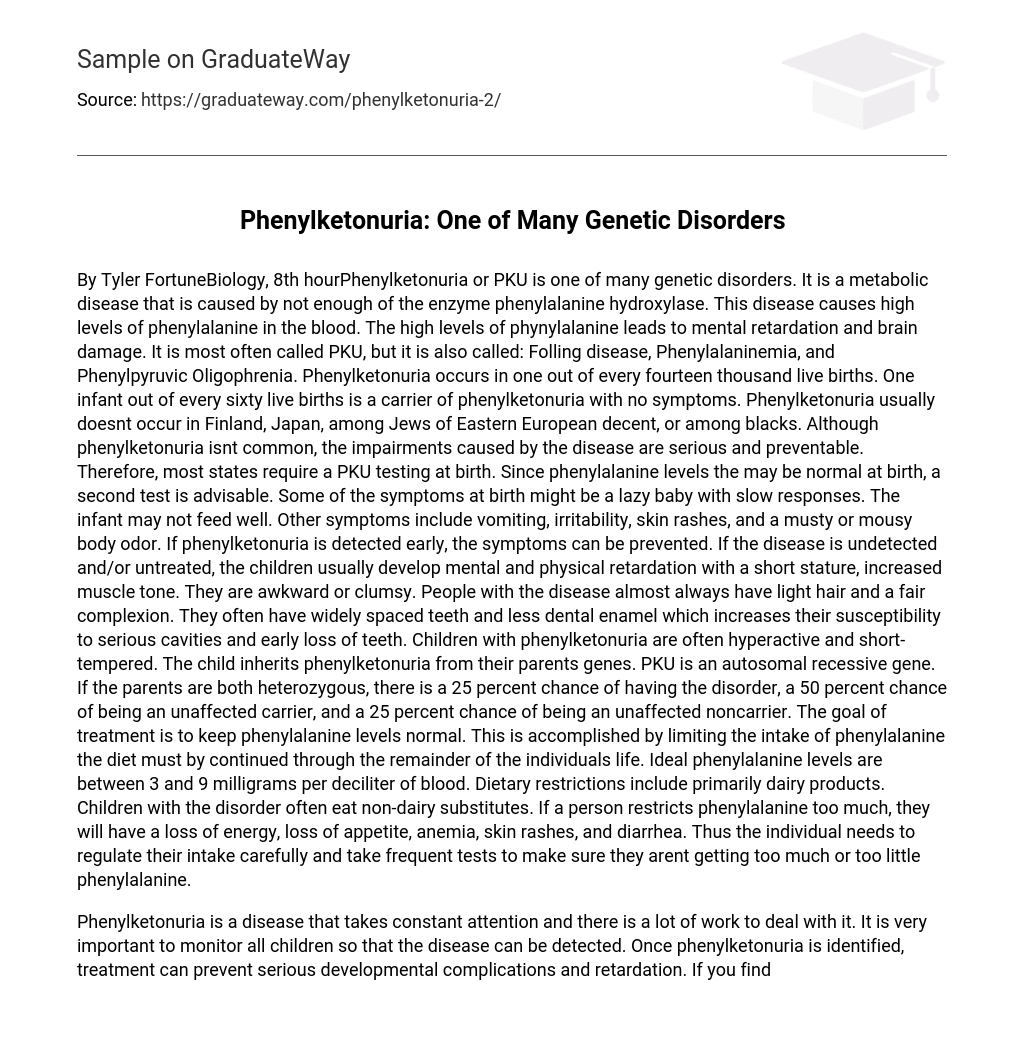Phenylketonuria or PKU is one of many genetic disorders. It is a metabolic disease that is caused by not enough of the enzyme phenylalanine hydroxylase. This disease causes high levels of phenylalanine in the blood. The high levels of phynylalanine leads to mental retardation and brain damage. It is most often called PKU, but it is also called: Folling disease, Phenylalaninemia, and Phenylpyruvic Oligophrenia. Phenylketonuria occurs in one out of every fourteen thousand live births. One infant out of every sixty live births is a carrier of phenylketonuria with no symptoms.
Phenylketonuria usually doesnt occur in Finland, Japan, among Jews of Eastern European decent, or among blacks. Although phenylketonuria isnt common, the impairments caused by the disease are serious and preventable. Therefore, most states require a PKU testing at birth. Since phenylalanine levels the may be normal at birth, a second test is advisable. Some of the symptoms at birth might be a lazy baby with slow responses.
The infant may not feed well. Other symptoms include vomiting, irritability, skin rashes, and a musty or mousy body odor. If phenylketonuria is detected early, the symptoms can be prevented. If the disease is undetected and/or untreated, the children usually develop mental and physical retardation with a short stature, increased muscle tone. They are awkward or clumsy. People with the disease almost always have light hair and a fair complexion. They often have widely spaced teeth and less dental enamel which increases their susceptibility to serious cavities and early loss of teeth.
Children with phenylketonuria are often hyperactive and short-tempered. The child inherits phenylketonuria from their parents genes. PKU is an autosomal recessive gene. If the parents are both heterozygous, there is a 25 percent chance of having the disorder, a 50 percent chance of being an unaffected carrier, and a 25 percent chance of being an unaffected noncarrier. The goal of treatment is to keep phenylalanine levels normal. This is accomplished by limiting the intake of phenylalanine the diet must by continued through the remainder of the individuals life.
Ideal phenylalanine levels are between 3 and 9 milligrams per deciliter of blood. Dietary restrictions include primarily dairy products. Children with the disorder often eat non-dairy substitutes. If a person restricts phenylalanine too much, they will have a loss of energy, loss of appetite, anemia, skin rashes, and diarrhea. Thus the individual needs to regulate their intake carefully and take frequent tests to make sure they arent getting too much or too little phenylalanine.
Phenylketonuria is a disease that takes constant attention and there is a lot of work to deal with it. It is very important to monitor all children so that the disease can be detected. Once phenylketonuria is identified, treatment can prevent serious developmental complications and retardation. If you find the disease, treatment involves careful attention but in the results of normal growth and development make it all worthwhile.
Bibliography
- Cooper, Robert Dr. Everything You need to Know about Diseases. Springhouse: Springhouse Co, 1996.
- Thoene, Jess M.D. Physicians Guide to Rare Diseases. Montavile:Dowden Publishing Company Inc., 1995.





